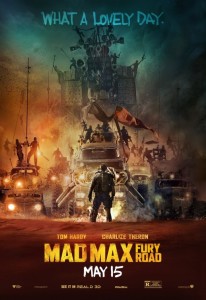I went into Mad Max: Fury Road excited as could be for two hours of the eye-popping, death-defying sci-fi road-rage lunacy the movie’s trailers had promised me. So why did I feel so unfulfilled when I got exactly that? I’d been on board with the striking imagery and overblown stunts of the movie’s marketing campaign from square one. But there are certain things movie trailers can’t really deliver, like character development or the emotional context that grounds the madness of action. A trailer provides a quick adrenaline rush of a movie’s most exciting elements, but trailers grow tiresome even 
Although Tom Hardy steps into the titular role that made Mel Gibson a household name, Fury Road isn’t so much a reboot as a loose continuation of vigilante roadster Max Rockatansky’s post-apocalyptic adventures. To its credit, the film shirks the lengthy and dull origin retellings that plague so many recent franchise revivals, setting up its dystopian future in a quick, vague and stylish prologue. The tragedy in Max’s past is repeatedly hinted at, but in a way that makes enough sense both to franchise devotees and newcomers. This time Max finds himself captured by the sadistic warlord Immortan Joe (Hugh Keays-Byrne, who also played the vicious Toecutter in the original Mad Max) and his devoted horde, known as the War Boys. Joe’s lieutenant, Imperator Furiosa (Charlize Theron), goes rogue and makes off with Joe’s five wives, setting out on a perilous journey across the wasteland to take the young girls to safety. As Joe and the War Boys give chase, Max finds himself dragged along for the ride.
And so do we, as the characters drive and fight, drive and fight, drive and fight almost endlessly. Granted, the Mad Max movies have never been complex character-based dramas, but at least the original two installments of the series had strong character-based moments that made all the action mean something. There’s a short respite about two-thirds of the way into Fury Road when we finally stop for some real character development and genuine emotional moments, mostly for Furiosa and the wives. But by the point the film turns any real attention toward its characters, I was already so disengaged from the action onscreen that it was too little, far too late. The new Max himself is hardly even a character at all; removed from the established personality Gibson brought to the role, Hardy’s Max is a total cipher. He could be played here by any of a number of actors more generic and less talented than Hardy.
Patrick Dunn
Latest posts by Patrick Dunn (see all)
- Interview with Alex Garland, writer/director of Ex Machina - April 24, 2015